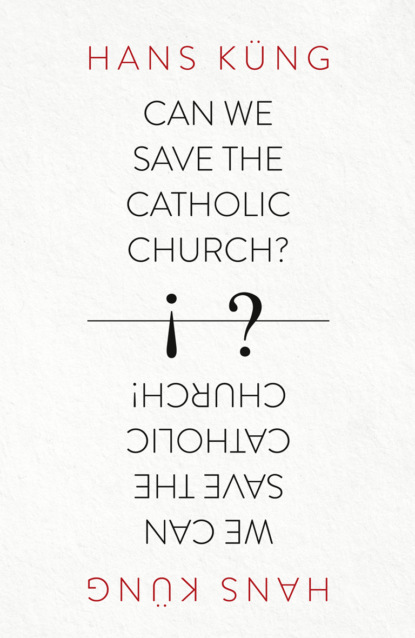По всем вопросам обращайтесь на: info@litportal.ru
(©) 2003-2024.
✖
Can We Save the Catholic Church?
Автор
Год написания книги
2019
Настройки чтения
Размер шрифта
Высота строк
Поля
2. Early Assertions of the Roman Claim to Primacy
Anamnesis
There was never a ‘Donation of Constantine’. What did happen was that, in AD 330, Emperor Constantine I transferred the imperial capital from ‘old’ Rome on the Tiber to ‘new’ Rome on the banks of the Bosporus, initiating a gradual decline of Roman imperial power in the West and even in the city of Rome itself. This shift of the centre of power towards the East was accompanied and intensified by the movement of Germanic tribes into the growing power vacuum in the West, resulting, in the year 410, in the first sack of the proud ‘eternal city’ of Rome, which had not been conquered since the times of the Roman Republic. Taken together, these two developments created a power vacuum in the West. In the fourth and fifth centuries, certain power-hungry Roman bishops capitalized on this vacuum and used it to expand their authority, aiming at universal primacy in the ecclesiastical sphere and universal sovereignty in the political sphere.
Let us briefly look at the changes that gradually became church law per viam facti (i.e. as a result of concrete actions of individual popes and their supporters). For the most part, they are still contained in canon law today, despite the fact that they lack biblical or theological foundation:
• Rome declared itself to be the general court of appeal for the whole Church (Bishop Julius in the middle of the fourth century based this claim on an erroneous interpretation of the Council of Nicaea in 325).
• The popes and their supporters began to interpret Jesus’ singling out of Peter, and especially the words recorded in Matthew 16:18, in a strictly juridical sense and used them to bolster Roman claims to supremacy. At the same time, they laid claim to the title ‘Apostolic See’ (sedes apostolica) as an exclusive Roman privilege, completely ignoring the existence of other ‘apostolic sees’ in the East (Bishop Damasus in the fourth century).
• The bishop of Rome began to call himself ‘pope’: ‘papa’, from the Greek pappas, was an affectionate honorific for one’s father, and had long since been one of the names used for all bishops in the Eastern part of the Roman empire, but in the West it was now appropriated by the bishop of Rome, who claimed exclusive right to its use. At about the same time, the popes also began to adorn their own decrees (‘statuta’) with the attribute ‘apostolic’, and adopted the style and terminology customarily used in the official civil documents issued by imperial Rome. Thus, inquiries sent to Rome by other bishops were now answered by curt decreta and responsa (Bishop Siricius at the end of the fourth century).
• The popes now demanded that every important matter, after it had been discussed and resolved in a synod of bishops anywhere in the West, must now be submitted to the bishop of Rome for his review and given binding authority by his approval and proclamation (Bishop Innocent at the beginning of the fifth century).
• All further appeals against Roman decisions were barred; judgements passed by the bishop of Rome were to be accepted as final and binding (Bishop Boniface in the fifth century).
And thus began the gradual process of the church in Rome, and particularly its bishop, monopolizing titles and legal rights that had originally belonged to many churches and their bishops or to the civil rulers, a process which continues to the present day. However, it should be noted that, during this early period, all of these historical ‘facts’ remained little more than empty claims. Particularly in Constantinople, where ultimate authority still rested solely with the emperor and where the city of Rome was generally looked down upon as merely the run-down capital of former times, such claims were completely disregarded. Thus, all attempts made by the bishops of Rome in the fourth and fifth centuries to assert and to exercise a divinely ordained, ruling primacy (iurisdictio) extending to the whole of the Church, based on Jesus’ choice of Peter and the promise made to him, had little or no real effect.
Even Augustine, that brilliant contemporary of many of these Roman bishops, who was himself bishop of Hippo Regius in North Africa and by far the most important theologian in the West, and one, moreover, who was positively inclined towards Rome, gave no more credence to the Roman bishops’ claim to universal jurisdictional primacy than did his great North African predecessor, Cyprian, the great bishop of Carthage, 200 years earlier. In Augustine’s final major work, his monumental City of God, the pope plays no role at all. For Augustine, all bishops were essentially equal. Although he regarded Rome as the centre of the empire and of the Church, Augustine gave no encouragement whatsoever to papalism, and he did not believe that Rome could legitimately claim supremacy or jurisdictional primacy over all the churches. For Augustine, the foundation of the Church does not rest on the person of Peter, much less on the persons of his successors, but instead on Christ and belief in Christ – a point that the young Joseph Ratzinger himself quite openly discussed and even defended in his 1953 doctoral dissertation on Augustine. For Augustine, the highest authority of the Church did not rest with the bishop of Rome but instead – in complete agreement with the entire Christian East – in the ecumenical council bringing together the bishops from all over the world. Moreover, not even to such an ecumenical council did Augustine ascribe any infallible authority.
Вы ознакомились с фрагментом книги.
Приобретайте полный текст книги у нашего партнера:
Приобретайте полный текст книги у нашего партнера:





